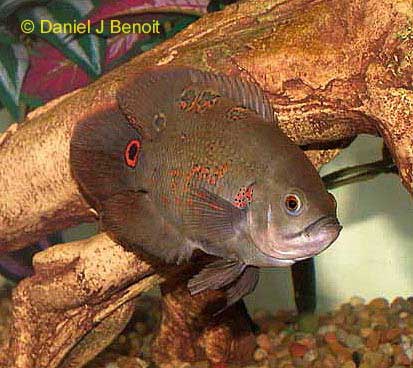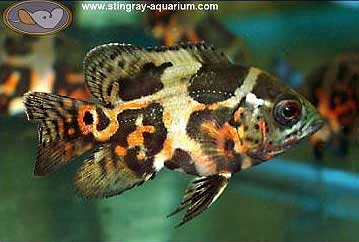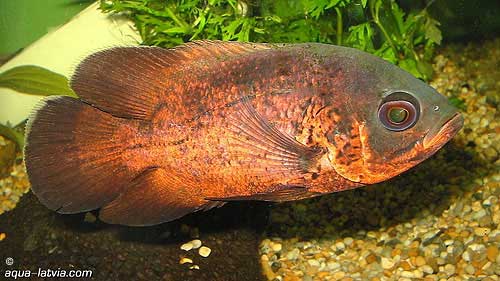Oscar Cichlid - Origins

Oscar Cichlid
The Oscar originates from the Amazon River basin in Peru, Colombia, Brazil and French Guiana. It is also known as the velvet cichlid and the marble cichlid. The Latin name Astronotus means ray back, while ocellatus refers to the eyespot on the base of the tail. Oscars have been bred into a variety of colors including albino, red, tiger and black. They also have been bred into a long fin variety. Oscars are narrow in width with an oval shape, a large mouth and a protruding jaw. Oscars are very hardy and they grow quite quickly when young. They are slow moving, but are capable of swimming rapidly. Despite their large size and compatibility problems, discussed below, Oscars are a very popular aquarium fish. They demonstrate intelligence and personality to their owners that make them a favorite. They will recognize their owner and can be fed from the hand.
Oscar Cichlid - Aquarium Setup
The general recommendation is to keep either one Oscar or a school of at least 6. A single Oscar will be very lonely, while groups of less than 6 will result in deaths inflicted by aggression. Following these guidelines, a tank of around 500 gallons is the best environment for Oscars. If you are able to determine a compatible pair, a 100 gallon tank is recommended. The tank should have dim lighting and it should be covered to prevent jumping out. Plants will be destroyed, so driftwood and rocks are recommended. Floating plants and plastic toys will be played with. Clean water is extremely important.

Oscar Cichlid
Oscar Cichlid - Curing Disease
Oscars are susceptible to Hole in the Head Disease. This condition, caused by the protozoan Hexamita, can be prevented by maintaining excellent water quality and a varied diet.
Oscar Cichlid - Feeding
Oscars will eat almost anything including cichlid pellets, cichlid flakes, earthworms, bloodworm, shrimp, bugs, frozen foods, krill, ghost shrimp, feeder fish, crayfish and insect larvae. Feeder fish are not usually recommended due to the risk of bringing disease into the aquarium and also because a diet of live fish can increase aggression.
Oscar Cichlid - Compatibility:
Oscars basically aren't compatible with other fish, however we have heard of some success with silver dollars, bala sharks, firemouths, texas cichlids, jack dempseys, blue acara, clown loaches, pictus catfish, African knifefish, plecostomus, pacus, gars and tin foil barbs. One of the main criteria for compatibility will be size, as Oscars will eat any other fish that it can fit in its mouth. More specifically, diameter is an issue, as Oscars can swallow some very long plecos over an extended period time.
Possible tank mates for Oscar Cichlids are appropriately sized African knifefish, bala sharks, blue acara, clown loaches, firemouths, jack dempseys, pacus, pictus catfish, plecostomus, silver dollars, texas cichlids and tin foil barbs

Oscar Cichlid
Oscar Cichlid - Breeding
Oscars are difficult to breed, mainly because it is hard to determine sexes. With the size constraint, it becomes a challenge to raise enough Oscars to be able to watch them pair off. The female will lay hundreds of eggs on a clean surface, which also makes raising the fry a challenge.
Oscar Cichlid - Profile
-
Scientific Name: Astronotus ocellatus
-
Family: Cichlid
-
Temperature: 22 - 26 C; 72 - 79 F
-
pH: 6.0 - 8.0
-
Size: 33 cm; 13 inches
-
Life Span: 10 years
-
Breeding: Difficult, Egg Layer